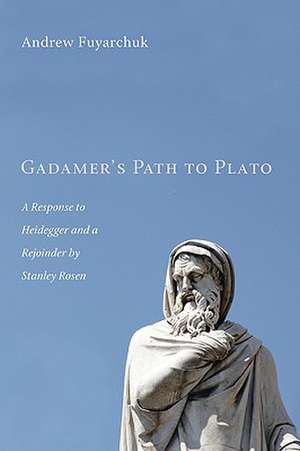Gadamer's Path to Plato: A Response to Heidegger and a Rejoinder by Stanley Rosen
Autor Andrew Fuyarchuken Limba Engleză Paperback – 28 feb 2010
Preț: 148.89 lei
Nou
Puncte Express: 223
Preț estimativ în valută:
28.49€ • 31.04$ • 24.01£
28.49€ • 31.04$ • 24.01£
Carte disponibilă
Livrare economică 03-17 aprilie
Preluare comenzi: 021 569.72.76
Specificații
ISBN-13: 9781606087725
ISBN-10: 160608772X
Pagini: 204
Dimensiuni: 150 x 226 x 10 mm
Greutate: 0.25 kg
Editura: Wipf and Stock Publishers
ISBN-10: 160608772X
Pagini: 204
Dimensiuni: 150 x 226 x 10 mm
Greutate: 0.25 kg
Editura: Wipf and Stock Publishers
Notă biografică
Andrew Fuyarchuk is an instructor of philosophy at Sheridan College and a PhD candidate at the Institute for Christian Studies in Toronto. He has published on Nietzsche's Zarathustra, Wagner's Tristan and Isolde, and Religion and Liberal Democracy in the Journal for the Fellowship of Catholic Scholars (Canadian chapter).
